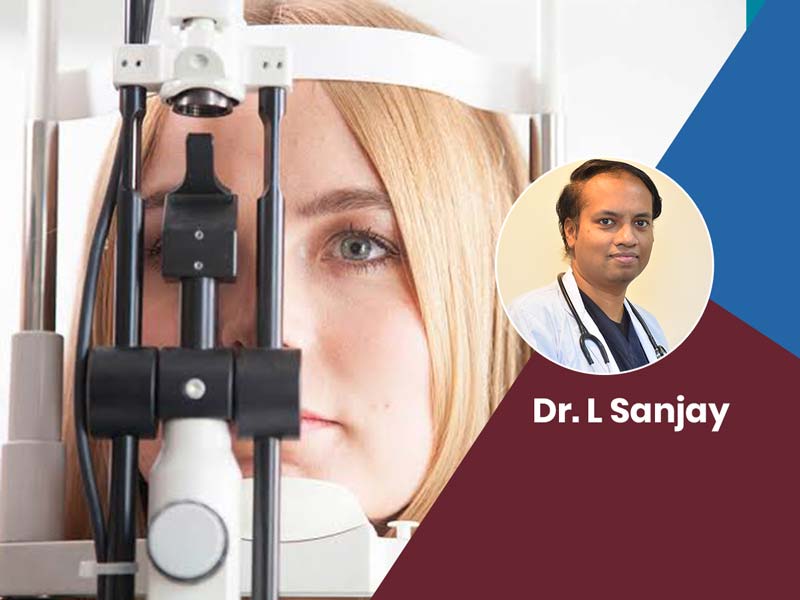
Diabetes is one of the most prevalent lifestyle diseases across the globe and it affects a number of organs in the human body. A prolonged high blood sugar level can have adverse effects on the kidneys and eyes. Diabetes can also lead to diabetic retinopathy, a condition that occurs when the tiny blood vessels inside the retina, at the back of the eye, are damaged as a result of diabetes. This can have a significant impact on vision and, in some circumstances, result in permanent blindness. If the blood sugar levels are not under control, and resulting in unmanaged diabetes, it can have a direct impact on the eyes and vision.
Table of Content:-
The retina is the light-sensitive layer of cells at the back of the eye that converts light into an electrical signal. The signals reach the brain, which transforms them into the images that we see. The retina requires a continual flow of blood, and a chronically high blood sugar level can cause swelling in the eye's tissues or poor vision, a disease known medically as diabetic retinopathy. Onlymyhealth editorial team spoke to Dr. L Sanjay, Internal Medicine Department at Apollo Spectra Hospital, Kondapur, Hyderabad, about the early warning signs of diabetic retinopathy.
Early warning signs of Diabetic Retinopathy
Diabetic Retinopathy is a condition that doesn’t show many symptoms in the initial stages. However, depending on the severity of the condition the symptoms start showing. A few of the prominent symptoms to look out for are:
1. Eye floaters

These are small dark shapes in the field of vision. It can appear as dots, strings, and specks. It is more visible when one looks at something plain and bright, such as the sky, white paper, or a computer screen. This is one of the most common symptoms experienced by people suffering from diabetic retinopathy.
2. Blurred Vision
A loss of clear vision is considered blurred vision. One can experience it suddenly or gradually in one or both eyes. The macula (a part of the retina at the back of the eye) which is responsible for giving sharp vision becomes cloudy due to the leak of blood vessels and therefore making the vision blurry.
3. Colour Changes
As the lens becomes cloudy due to damaged blood vessels, it changes color from yellow to brown. One can also find it difficult to identify colors like blue or purple. Dark colors will appear black and one can notice the difference in the vision because it will have a brownish tint.
Also read: Diabetics Don't Develop Diabetic Retinopathy Within 10 Years Of The Disease: Dr Rajesh
4. Loss of Side Vision
Diabetic retinopathy is a condition that damages the optic nerve because it clogs the front chamber of the eye. This exerts pressure on the retina which can lead to loss of the side vision first then leading to tunnel vision and moves progressively to involve the central vision.
Apart from these, there are other signs as well like:
● Patches or streaks that obstruct a person’s vision
● Total and sudden loss of vision
● Impaired vision at night
● A dark or empty vision in the center of the vision
Diabetic retinopathy treatment

The treatment plan for diabetic retinopathy depends on multiple factors, including the severity of the condition and response to the previous treatments in the early stages. Depending on these factors, the doctor can decide the treatment plan that is best suitable for the person. Some of the common treatment options are:
● Laser Treatment - Scatter laser surgery, also known as pan-retinal photocoagulation, is a procedure that uses e targeted lasers to reduce blood vessels in the eye and seal the leaks caused by abnormal blood vessels. This treatment is performed to either stop or to reduce the leakage of blood as well as the build-up of fluid in the eye.
● Injections - A few medications are known to reduce swelling and manage blood vessels leaking in the eyes. But these anti-VEGF drugs and corticosteroids are over-the-counter medications, they must always be prescribed under the supervision of a specialist.
Also read: Diabetes Retinopathy
Conclusion
Diabetes and its ramifications can be prevented by controlling blood sugar levels. There are various ways through which one can keep blood sugar balanced. For instance by eating a healthy diet, exercising regularly, having a moderate body weight, reducing or quitting smoking, and drinking alcohol. Regular monitoring of sugar levels is beneficial. Early detection of symptoms can prevent you from contracting serious complications.
Read more articles on Diabetes
Image credits: ccteyes.com
Also watch this video
How we keep this article up to date:
We work with experts and keep a close eye on the latest in health and wellness. Whenever there is a new research or helpful information, we update our articles with accurate and useful advice.
Current Version